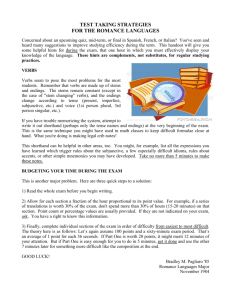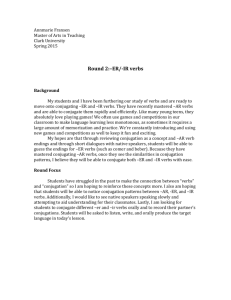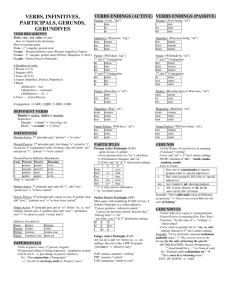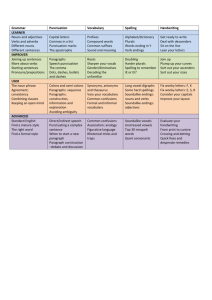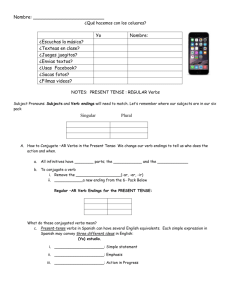gcse latin verb endings
advertisement
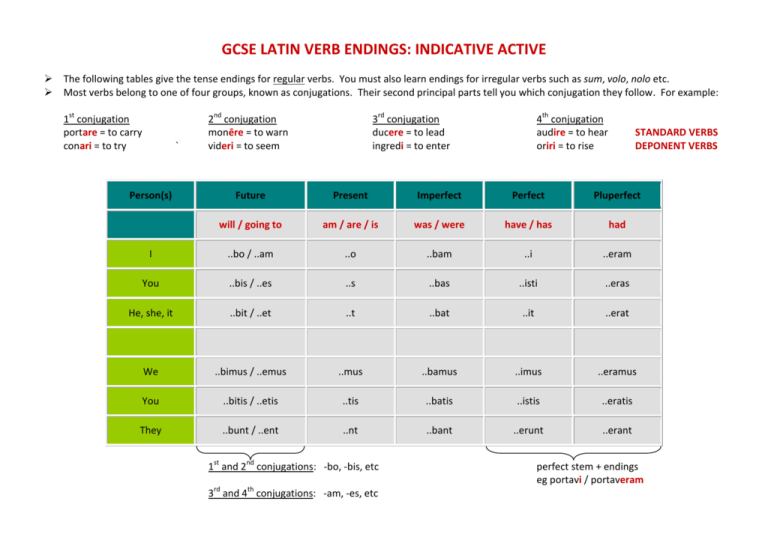
GCSE LATIN VERB ENDINGS: INDICATIVE ACTIVE The following tables give the tense endings for regular verbs. You must also learn endings for irregular verbs such as sum, volo, nolo etc. Most verbs belong to one of four groups, known as conjugations. Their second principal parts tell you which conjugation they follow. For example: 1st conjugation portare = to carry conari = to try ` Person(s) 2nd conjugation monēre = to warn videri = to seem 3rd conjugation ducere = to lead ingredi = to enter 4th conjugation audire = to hear oriri = to rise STANDARD VERBS DEPONENT VERBS Future Present Imperfect Perfect Pluperfect will / going to am / are / is was / were have / has had I ..bo / ..am ..o ..bam ..i ..eram You ..bis / ..es ..s ..bas ..isti ..eras He, she, it ..bit / ..et ..t ..bat ..it ..erat We ..bimus / ..emus ..mus ..bamus ..imus ..eramus You ..bitis / ..etis ..tis ..batis ..istis ..eratis They ..bunt / ..ent ..nt ..bant ..erunt ..erant 1st and 2nd conjugations: -bo, -bis, etc 3rd and 4th conjugations: -am, -es, etc perfect stem + endings eg portavi / portaveram GCSE LATIN VERB ENDINGS: INDICATIVE PASSIVE This table gives the tense endings for indicative passive verbs. Remember deponent verbs are also passive in form, but always translated actively. Person(s) Future Present Imperfect Perfect Pluperfect will be / going to be am / are / is (being) was / were (being) have / has been had been I ..bor / ..ar ..or ..bar ..sum ..eram You ..beris / ..eris ..ris ..baris ..es ..eras He, she, it ..bitur / ..etur ..tur ..batur ..est ..erat We ..bimur / ..emur ..mur ..bamur ..sumus ..eramus You ..bimini / ..emini ..mini ..bamini ..estis ..eratis They ..buntur / ..entur ..ntur ..bantur ..sunt ..erant 1st and 2nd conjugations: -bor, -beris, etc 3rd and 4th conjugations: -ar, -eris, etc perfect participle + endings eg portatus sum / portati erant (participle ending changes to agree with number & gender) GCSE LATIN VERB ENDINGS: SUBJUNCTIVE ACTIVE Subjunctive verbs are found in the following clauses: cum (when, since), purpose and result. They are also found in indirect questions and indirect commands. For GCSE you only need to learn the imperfect and pluperfect tenses. Person(s) Imperfect Pluperfect was / were had I ..m ..issem You ..s ..isses He, she, it ..t ..isset We ..mus ..issemus You ..tis ..issetis They ..nt ..issent present active infinitive + endings eg portarem / audirent perfect stem + endings eg portavissem GCSE LATIN VERB ENDINGS: SUBJUNCTIVE PASSIVE This table gives the tense endings for subjunctive passive verbs. Remember deponent verbs are also passive in form, but always translated actively. Subjunctive verbs are found in the following clauses: cum (when, since), purpose and result. They are also found in indirect questions and indirect commands. For GCSE you only need to learn the imperfect and pluperfect tenses. Person(s) Imperfect Pluperfect was / were (being) had been I ..r ..essem You ..ris ..esses He, she, it ..tur ..esset We ..mur ..essemus You ..mini ..essetis They ..ntur ..essent present active infinitive + endings eg portarer / audirentur perfect participle + endings eg portatus essem / portati essent (participle ending changes to agree with number & gender)
